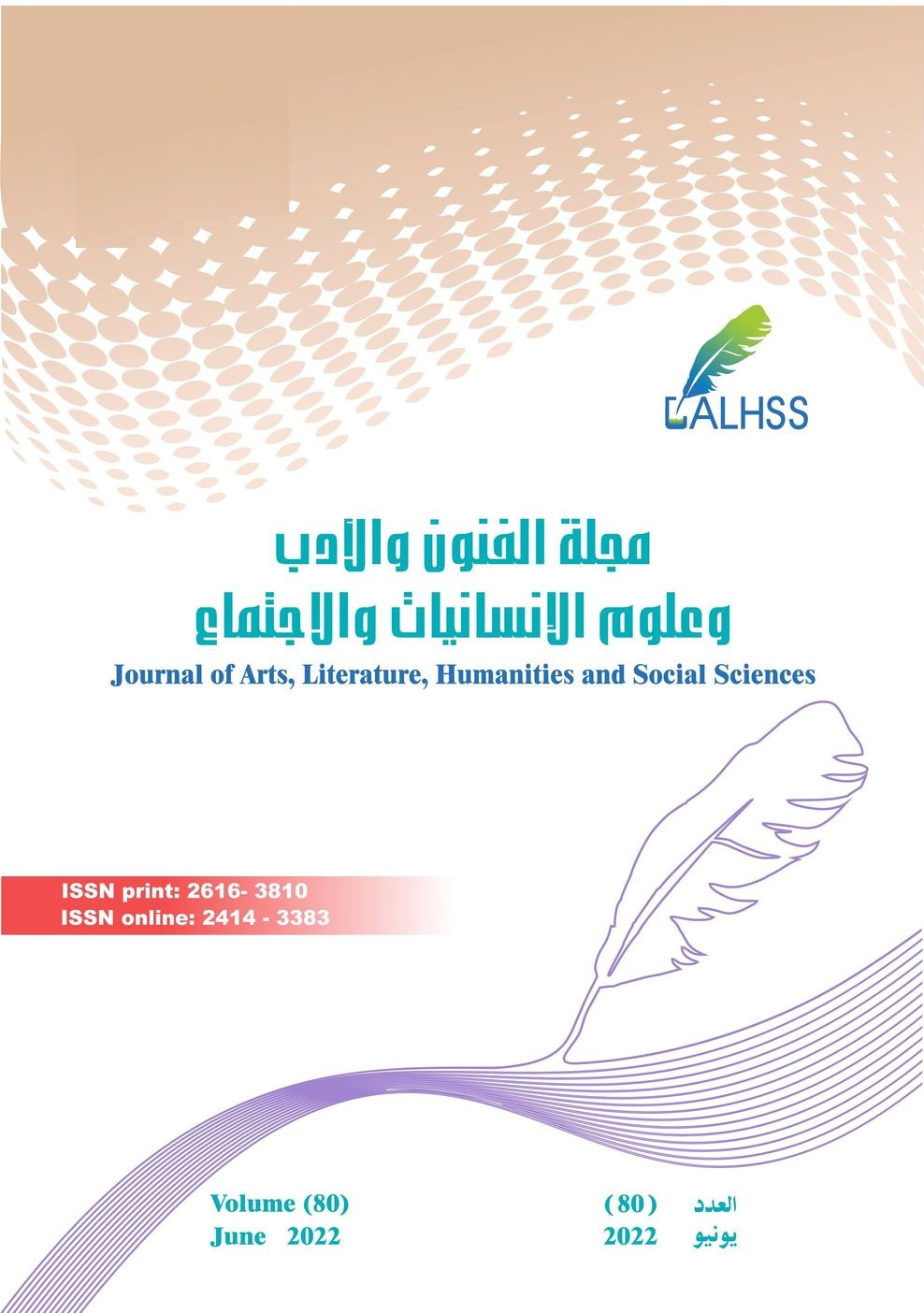The Effectiveness of an Educational Program with Augmented Reality Technology in Acquiring The Skills And Knowledge of Drawing The Female Model for Students of Clothing and Textiles
Abstract
E-learning is one of the most important developments taking place in the world, as it allows the provision of training and educational programs through computer technology and the Internet in a synchronous or asynchronous manner. Augmented reality (AR) software relies on using a smartphone and tablet camera to see the real reality, then analytical according to what is required of the program, and work to integrate virtual elements into it.
The aim of the research is to:
1- Building an educational program using augmented reality technology to provide students with the skills and knowledge of drawing the female model.
2- Measuring the effectiveness of the educational program in providing students with basic skills in drawing the female model.
3- Using modern technology represented in the use of augmented reality technology in teaching and simplifying the drawing of the female model for female students.
The search found:
1- There are statistically significant differences between the average scores of female students in the pre and post application of the educational program using augmented reality technology to acquire the skills and knowledge of drawing the female model in favor of the post application.
2- There are statistically significant differences between the mean scores of the female students in the pre and post application of the achievement test in favor of the post application.
3- There are statistically significant differences between the average scores of female students in the pre and post application of the skill performance assessment scale in favor of the post application.
References
2- الشريف، بندر بن أحمد بن علي وآل مسعد، أحمد بن زيد بن عبد العزيز (2017) أثر استخدام تقنية الواقع المعزِّز في مادة الحاسب الآلي على التحصيل لطلاب الصف الثالث الثانوي في منطقة جازان، المجلة التربوية الدولية المتخصصة -المجموعة الدولية للاستشارات والتدريب -الأردن، المجلد 6: العدد 2: 220-230.
3- الحلو، نرمين مصطفى حمزة (2017) فاعلية تدريس وحدة مقترحة في الاقتصاد المنزلي قائمة على استراتيجية التخيل العقلي بتقنية الواقع المعزز لتنمية التفكير البصري وحب الاستطلاع لدى تلميذات المرحلة الابتدائية، دراسات عربية في التربية وعلم النفس – السعودية، العدد 91: 87-150.
4- الحسيني . مها (2014). أثر استخدام تقنية الواقع المعزز (augmented reality) في وحدة مقرر الحاسب الآلي في تحصيل واتجاه طالبات المرحلة الثانوية. رسالة ماجستير غير منشورة، جامعة أم القرى، مكة المكرمة، المملكة العربية السعودية.
5- العبيد، أفنان عبد الرحمن والشايع، حصة محمد (2018م) تكنولوجيا التعليم الأسس والتطبيقات، الطبعة 2، الرياض: مكتبة الرشد – فهرسة مكتبة الملك فهد الوطنية اثناء النشر.
6- العمرجي، جمال الدين إبراهيم محمود (2017) فاعلية استخدام تقنية الواقع المعزز في تدريس التاريخ للصف الأول الثانوي على تنمية التحصيل ومهارات التفكير التاريخي والدافعية للتعلم باستخدام التقنيات لدى الطلاب، المجلة التربوية الدولية المتخصصة -المجموعة الدولي للاستشارات والتدريب – الأردن، المجلد 6: العدد 4: 135-155.
7- الغامدي، ابتسام أحمد محمد وعسيري، خالد بن معدي بن أحمد (2018) أثر استخدام الواقع المعزز في تحصيل الرياضيات لدى طالبات المرحلة المتوسطة، المجلة الدولية للعلوم التربوية والنفسية -المؤسسة العربية للبحث العلمي والتنمية البشرية – مصر، العدد 13: 222-289.
8- بخاري، سناء معروف (2013م) الباترون الأساسي وتصميم البنسات الوظيفي والزخرفي، الطبعة 2، الرياض: دار الزهراء – فهرسة مكتبة الملك فهد الوطنية اثناء النشر.
9- جامعة القصيم (1438هـ)، كتاب أبحاث مؤتمر دور الجامعات السعودية في تفعيل رؤية (2030)، بريدة: جامعة القصيم.
10- جودة، بسمة محمد (2019). فعالية أداة التفاعل في كتب الواقع المعزز في تنمية التحصيل الدراسي لدى طلاب شعبة الملابس والنسيج بمدارس التعليم الثانوي الفني. مجلة دراسات تربوية واجتماعية، م (25)، ع (7)، 99- 170.
11- خميس، محمد عطية (2015) تكنولوجيا الواقع الافتراضي وتكنولوجيا الواقع المعزز وتكنولوجيا الواقع المخلوط، تكنولوجيا التعليم –مصر، مجلد 25: العدد 2: 1-3.
12- سلامة، دعاء نبيل علي (2017). بيئة افتراضية مقترحة لتنمية معارف ومهارات الطالبات في رسم نموذج الدريش، مجلة التصميم الدولية، المجلد7: العدد4: 317-331.
13- عبد العال، رانيا مصطفى كامل ومحمد، وسام محمد إبراهيم (2016) فعالية برنامج تعلم الكتروني لإكساب معارف ومهارات بناء وتصميم نماذج ملابس الأطفال، مجلة التصاميم الدولية، المجلد6: العدد3: 165- 173.
14- علي، سحر علي زغلول (2011). فعالية وحدة تعليمية في تصميم ملابس النساء الداخلية والمنزلية اللانجري في تنمية معارف ومهارات واتجاهات طلاب قسم الملابس والنسيج، مجلة علوم وفنون - دراسات وبحوث، المجلد 23: العدد 2: 1-25.
15- غانم، صفاء يوسف محمد (2013). فاعلية برنامج حاسوبي في تنمية التحصيل ومهارات رسم باترون الجونلة لطالبات قسم الملابس الجاهزة، مجلة كلية التربية بالإسماعيلية – مصر، العدد26: 222-203.
16- Cai, Su & Wang, Xu & Chiang, Feng-Kuang. (2014). A case study of Augmented Reality simulation system application in a chemistry course. Computers in Human Behavior. 37. 31–40.
17- Carmigniani, J., & Furht, B. (2011). Augmented Reality: An Overview. In B. Furht (Ed.), Handbook of Augmented Reality (pp. 3-46). New York, NY: Springer New York.
18- Estapa, A. & Nadolny, L. (2015). The Effect Of An Augmented Reality Enhanced Mathematics Lesson On Student Achievement And Motivation. Journal Of Stem Education. 6(3). 40-47.
19- Kipper, G., & Rampolla, J. (2012). Augmented reality (1st ed.) Syngress.
20- Lee, Kangdon. (2012). Augmented Reality in Education and Training. TechTrends. 56.
21- Majid, N. , Mohammed, H. , & Sulaiman, R. (2015). Students’ Perception of Mobile Augmented Reality Applications in Learning Computer Organization. Procedia - Social and Behavioral Sciences, 176 .
22- Pence, H. E. (2010). Smartphones, smart objects, and augmented reality. The Reference Librarian, 52(1-2),
23- Renner, J. (2014). Does Augmented Reality Affect High School Students’ Learning Outcomes In Chemistry? Ph.D. Master. Grand Canyon University.
24- Solak, E. & Cakır, R. (2015). Exploring The Effect Of Materials Designed With Augmented Reality On Language Learners’ Vocabulary Learning. The Journal Of Educators Online-Jeo. 13 (2). 50-73.
25- Thornton, T. (2014). Understanding How Learner Outcomes Could Be Affected Through The Implementation Of Augmented Reality In An Introductory Engineering Graphics Course. Ph.D. These. Graduate Faculty. North Carolina State University.
26- Wasko, Christopher. (2013). What Teachers Need to Know About Augmented Reality Enhanced Learning Environments. TechTrends.



